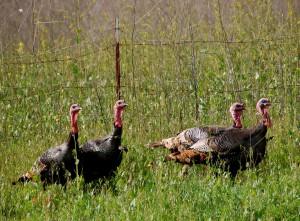When I first saw the headline I was hoping I’d find an article describing the first fruits of the turkey genome project (which I talked about back in november.) Instead, and still interestingly, what was just published in the Proceedings of the National Academy of Sciences was a study showing that wild turkeys have been domesticated twice by different cultures in the Americas.
The turkeys we eat today come from a breed domesticated by the Aztecs, living in present day Mexico (or proceeding cultures occupying that region). However this study, looking purely at mitochondrial DNA sequences was able to use DNA isolated from bones and turkey droppings to determine that turkeys kept by indigenous farmers in what is now the American southwest represented an independent domestication of wild turkeys from one of a couple of wild turkey subspecies found in North America. Given the uncertainties of archeological dating, the most recent evidence for the existence of this second form of domesticated turkey could be as early as 1400 AD or as late as 1840 AD.

The Cliff Palace, the largest of the ancient villages in Mesa Verde Park. Photo: j-fi, flickr (click to see photo in original context)
What’s fascinating to me is (more…)

